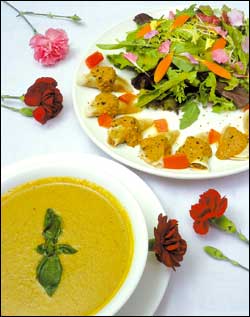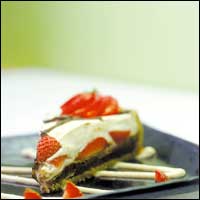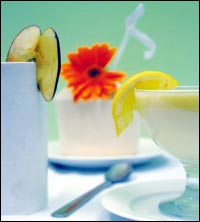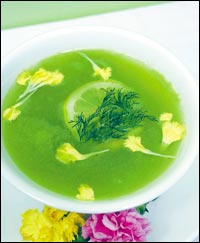|
Published June 28 - July 4, 2000 |
 EAT IT RAW! EAT IT RAW!
BY DEBRA DESALVO
Blenders, Sprouters, and Mashers
Process Food in the East Village
|
"Yo! Any vegetarians in the
house?" hollers Stic.man of hip-hop's radical duo Dead Prez. A roar and dozens of
fists rise up in CBGB, which is packed. It's 3 a.m. and the young, mostly Latino crowd has
been hanging all night for a showcase of politically conscious Latin bands booked by
Ricanstruction. Despite the late hour, the air is strangely smoke-free.
"Any vegans?!" More shouts from the crowd. "All
right!" Stic nods enthusiastically, dreads bouncing as he hops back and forth.
"What about the raw foodists? Any raw foodists in the house?"
A few whoops and hands shoot up, waving wildly. "Yeah!" Stic shouts.
"That's the shit!" as Dead Prez slam into "Be Healthy," from their
Loud debut album, Let's Get Free.
"Be Healthy" exhorts would-be revolutionaries to forgo fried
chicken for juiced greens. They should play it at New York's newest raw food restaurant,
Quintessence. "It's a political act to eat raw foods, because major corporations are
poisoning people with over-processed, denatured food," says Dan Hoyt.

Hoyt and his wife, Tolentin Chan, both 37, opened Quintessence in
December above his former recording studio on East 10th Street. A sandy-haired
Midwesterner with twinkling ice-blue eyes, Hoyt first reduced his space to rubble 16 years
ago, cutting a hole in the floor and installing Vital Music in the basement. He recorded
scads of East Village rockers, from Alice Donut to Clowns for Progress. In 1997 he tore
the place apart and reemerged with the Lab, which specialized in custom sound design.
Meanwhile, Chan was doing some rewiring of her own. A technical
designer at DKNY, Chan had asthma and caught frequent colds. When a colleague raved about
the effects of a raw food "cleanse," Chan visited her counselor, David Jubb, a
self-described "specialist in colloidal biology" with a Ph.D. from NYU, who's
been eating raw for 27 years. He guided her through "nutritional fasts"
consisting of smoothies, blended soups, and juices. Today Chan, a slender woman with
bright black eyes, gorgeous skin, and a quick, slightly mischievous smile, recalls,
"My health improved tremendously. Now I'm 100 percent raw and my asthma is completely
gone. I never get sick, and my energy is really high."
Inspired, Hoyt saw Jubb too. "The results from fasting are really
drastic, so it's very motivating," Hoyt says. "I lived with hay fever, food
allergies, but when these problems go away and you learn more about eating this way, it
seems so logical."
The raw food diet consists of fresh fruits, vegetables, and sprouted
seeds, nuts, grains, and legumes. "Sprouted grain loses its enzyme inhibitors and
releases more nutrients," explains Jubb. Raw foodists obtain most of their calories
from monounsaturated fats like avocado, young coconut, and olive and flax oils, instead of
cooked grains and beans. Protein and minerals come from leafy greens, spirulina, bee
pollen, seeds, and nuts.
"People assume raw food is hard to digest," Hoyt notes,
"but when you cook food you destroy its enzymes and must use your own to digest it.
Raw food digests itself. You don't even have to eat it—if you blend a tomato and
leave it overnight, it'll be 90 percent digested by the morning. Cooking was invented to
prevent foods from breaking down overnight."
"When you eat cooked vegetarian food, you lose the life force raw
food has," says Chan. "Vegetarians are calm and relaxed, but they don't always
look energized, don't have that vibrant, glowing quality. That's the difference between a
raw foodist and a vegetarian."
Chan and Hoyt began attending classes and lectures around
town."People were into the nutrition, but they weren't making the greatest tasting—or
looking—food," Hoyt says, laughing. "We were making really good food at
home."
So he gutted his space once again and, with Chan, created Quintessence.
They opened in bitter weather, but lines soon formed out the door. "I thought there
were a few hundred raw foodists in the city, but there are at least a few thousand!"

The Apple Pie Shake, Coconut shake, and Weird "electrolyte
Lemonade." |
Neighbors are drawn in by the restaurant's calm beauty and gourmet
menu. "People think eating raw is gonna be like chewing on weeds," Hoyt says,
"but raw food is very vibrant. We use lots of spices and sauces. The flavors are very
strong and clean."
These days Quintessence has regular customers from the tristate area
and beyond. "Six kids drove 16 hours from Iowa to get here after they found us on the
Internet!" Hoyt exclaims.
Competitive triathlete Mathew Mercur, 26, another customer, is
convinced that eating raw enhances his athletic performance. "I was nervous to try
it," Mercur admits, "but now I'm 90 percent raw and I love it! I never get sick,
I can train more, and I recover faster." Mercur, who won the U.S. triathlon series
championship for his age class and is training for the 2004 Olympic trials, says he
benefits from the concentrated nutrition provided by juicing and loading up on raw fats.
"I find fats a better source of long-term fuel than cooked carbs, which weigh me
down."
As for protein, Mercur says, "When you eat a steak, you have to
break it down to amino acids. But leafy greens, nuts, and seeds are packed with amino
acids and minerals your body can use to build protein right away."
Until recently, the main resources for someone like Mercur were classes
and coaching provided by High Vibe, the city's only store devoted to raw foods, and
lectures and counseling by Jubb and his ex-wife, Annie.
Jubb, raised on an island between mainland Australia and Tasmania, was
influenced by his Nepalese grandfather, "who understood that our choice of food was
affecting the earth." Jubb loves the East Village because "there are more people
interested in this lifestyle here than in any other place in the country. There's a
critical mass of consciousness building that's going to affect the entire earth."
Dagger, who owns High Vibe, also senses an accelerating interest in raw
food among New Yorkers. "We get new people in here every day, and now with
Quintessence, more people are getting together and communicating. Things are
rolling." Like Hoyt, Dagger transformed his former creative space—"my art
studio, my darkroom"—into his business. He describes his inviting basement, with
its cavelike white stucco walls and strings of white icicle lights, as "the East
Village gone Southwest—a sanctuary, a place for people to hang out."
A laid-back artist-photographer-musician with tattoos running up both
arms, Dagger got into raw foods because "I had done so many drugs and I just felt so
bad. But I always tried to eat right. I started riding my bike like crazy and eating a lot
of watermelon. I felt compelled to eat tons of it. I found out later that it's very
alkalinizing, and drugs make you very acidic." Although he credits eating live foods
with his vibrant health and ability to function on four to five hours of sleep, Dagger
says he's "not in favor of zealotism. Do you feel good? That's the only thing that
should influence your decision."
Paul Nison, who's developing a restaurant called Eden above the Hygeia
Center on East 23rd Street, agrees. Nison was diagnosed with ulcerative colitis and told
diet had nothing to do with it. Desperate, he experimented with raw foods and his symptoms
disappeared. "I was told that by 30 I'd be lucky to have my intestines and I'd
probably have cancer. I'll be 30 this year, and I did a 117-mile bike race, and haven't
gone back to my doctor."
Jubb student Narda Narv„ez, a physical therapist, founded the Natural
Wellness School at Hygeia in February. "I started the school to help the
community," she says. "Food is so connected with family and comfort that you
need a new family to support this." Narv„ez, looking for a new space, intends to
bring in a variety of health practitioners. She's starting a database of clients who have
recovered from serious illness using raw foods "because we need documentation and
research."
Jyni Holland, a registered dietitian at NYU Medical Center, wants to
see such research, as "there are no scientific studies showing an advantage to eating
raw broccoli instead of cooked broccoli." Holland also contests claims that raw foods
provide greater enzymatic activity, because "the minute you pull a plum off the tree,
you've separated it from its life force and it begins to break itself down. I don't want
to put this diet down without knowing more," she adds, "but if you have an
immune system compromised by chemo or severe AIDS, we recommend a 'no raw food' diet to
protect against bacterial infections. I would also be concerned about adequate caloric
intake, and adequate protein, B12, calcium, and zinc."

Holistic physician Dr. Ronald Hoffman notes that "some people do
really well on the raw food diet, yet some do abysmally. I do put some cancer patients on
a raw food diet, as it is marvelous for detoxifying. We usually use it for two to three
months." Lots of fats will "alleviate some of the potential problems with this
diet. I give high doses of coconut oil to patients with immune problems, for example, as
studies show it to be extremely helpful. Also, if you have ulcerative colitis or celiac
disease, using only sprouted starches can help."
Hoffman favors metabolic typing, a blood-test-based method of
determining appropriate diets. "We are finding that some people must have meat, while
for others it's not metabolically suitable. My hunch is that the people doing well on raw
food would be shown by metabolic typing to be in the latter category." He cautions
that "people use food like a personal statement—too much of that is going
around. It's best to avoid arrogance . . . or using food as an emblem of virtue. The
macrobiotic people destroyed their movement with arrogance."
Eliot Tokar, a practitioner of traditional Asian medicine, agrees.
"A raw food diet is a very strong yin diet; most people can benefit when it's used
for a limited period. It's in danger of becoming a fad, however, with people thinking it
can be applied in any situation and be beneficial. This may be because the diet can cause
very rapid change and can make you hyper and spacey."
While building Quintessence, Chan and Hoyt flew to San Francisco to
work at Juliano Brotman's Organica, a popular raw food restaurant. "Juliano was so
helpful," recalls Hoyt. "He gave us names of suppliers, showed us recipes. This
is kind of a movement, so if you know something you share it. It's a supportive community—everybody's
networking. We love that people come to the restaurant and actually talk to people at
other tables. That's what it's all about."
photographs by Michael Kenneth Lopez
Resources
Quintessence
263 East 10th Street
646-654-1823
Open Tuesday through Sunday 5 to 11 p.m.
Classes forming, call for details. High Vibe Health and Healing
85 East 3rd Street, rear
888-554-6645 212-777-6645
Open Monday through Friday 11 a.m. to 7 p.m., Saturday 11 a.m. to 5 p.m. Raw food prep
classes Wednesday at 7:30 p.m., $20
www.highvibe.com info@highvibe.com
The Hygeia Center
18 East 23rd Street
212-353-5000
www.hygeiacenter.org |
Eden Vegetarian
Restaurant
18 East 23rd Street
800-525-7973
www.rawlife.com David Jubb,
Ph.D.
514 East 5th Street, #7-10
212-539-8444
www.lifefood.com
LifeFood Recipe Book,
Excellence Inc., 1999, $25
Lectures Tuesday nights, 8 to 10,
New Life Resource Center, 939 Eighth Avenue, #207,
between 55th and 56th streets, $5
Raw: The Uncook Book
by Juliano with Erika Lenkert,
HarperCollins, 1999, $32 |
|
